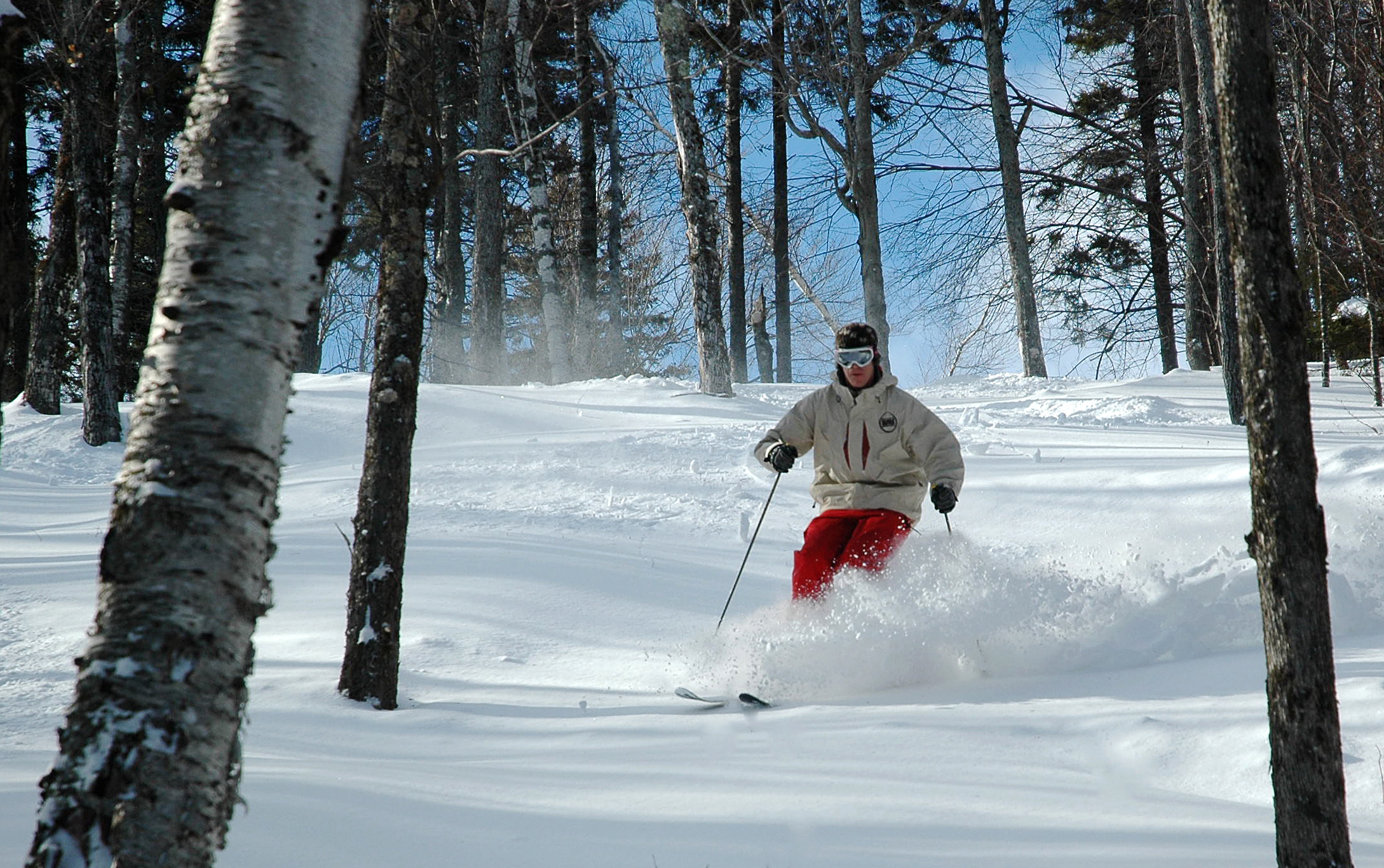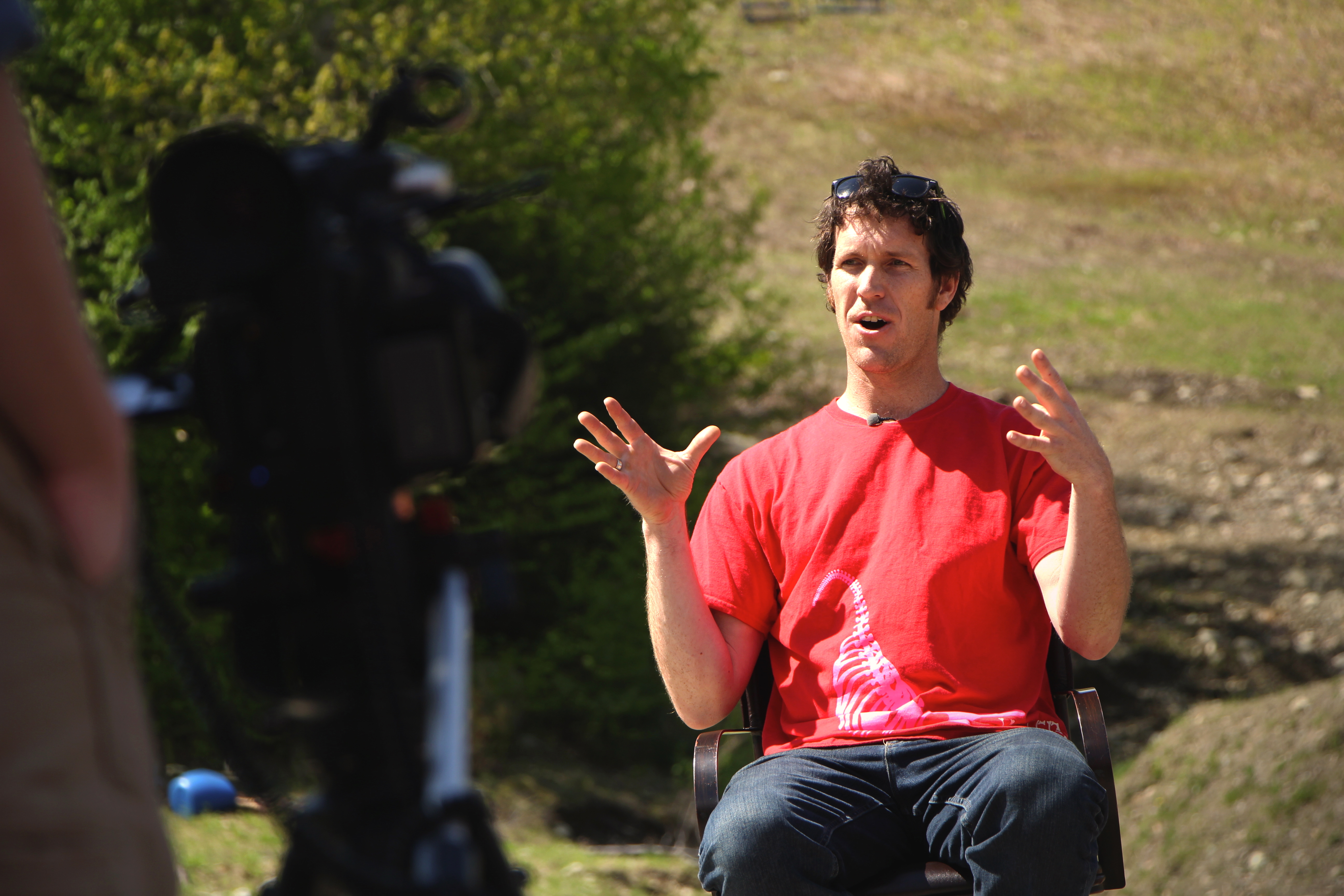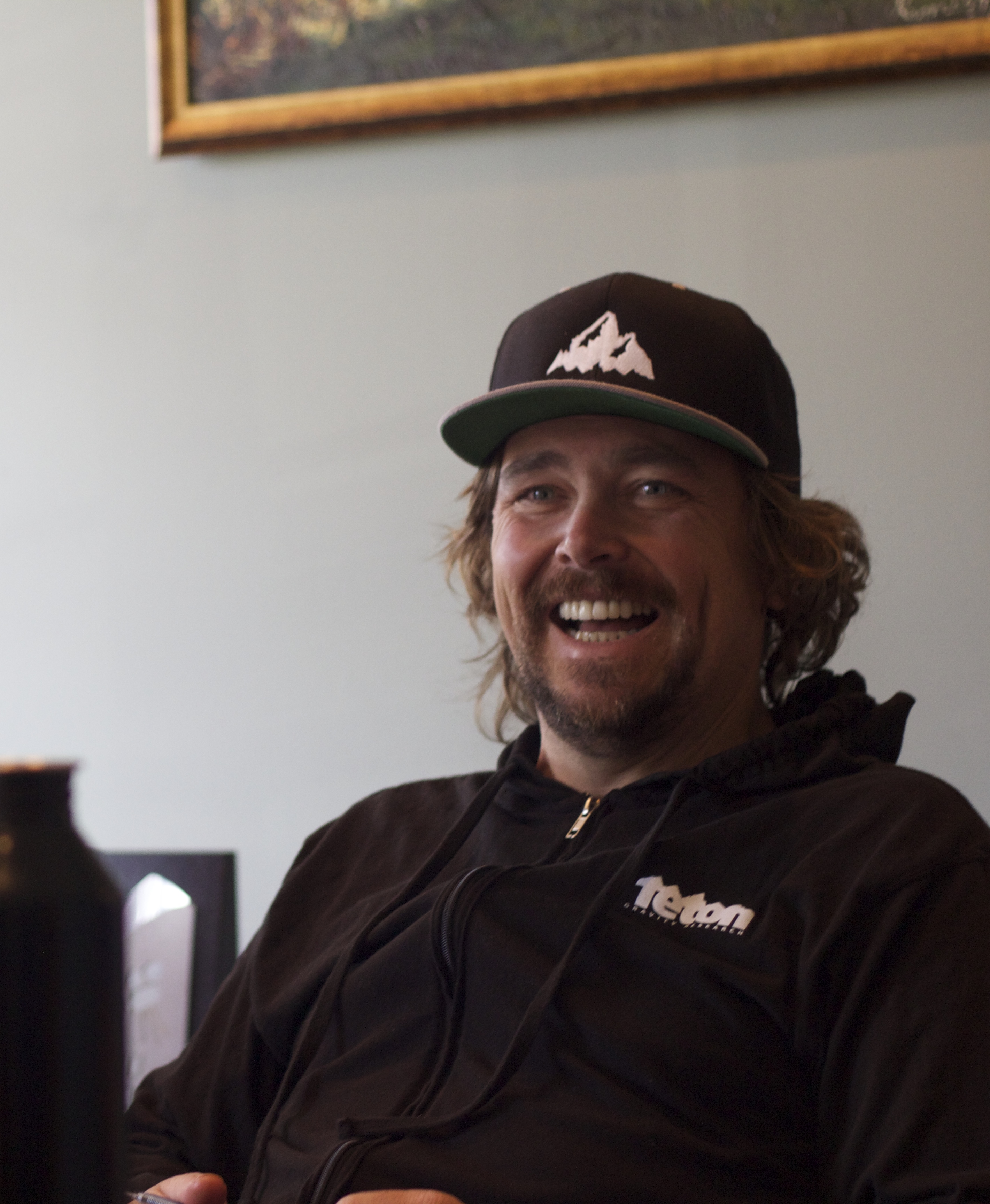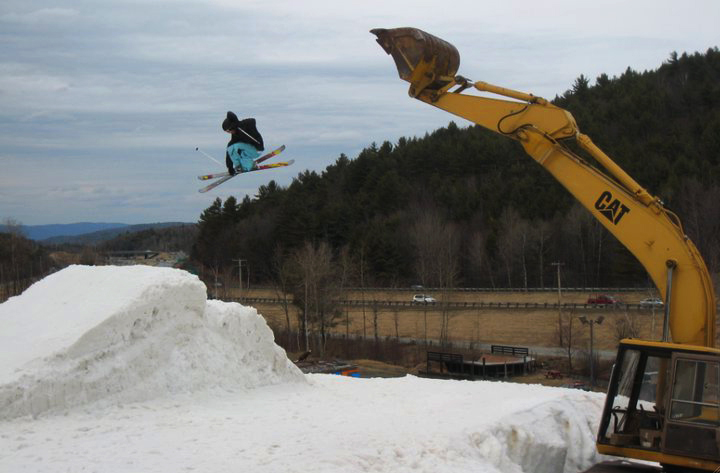 Evan Dybvig enjoys a rare East Coast pow day at Whaleback Mountain.
Evan Dybvig enjoys a rare East Coast pow day at Whaleback Mountain.
"Local ski area closes due to insufficient funds and lack of snow." The story is all too familiar in the modern ski industry. Each year such tales highlight the demise of small ski areas across the country. Local hills, which rely heavily on cold weather and the presence of natural snow, have felt the effects of warming seasons on their ability to remain in operation.
Whaleback Mountain, in Enfield, New Hampshire, is one of many U.S. ski resorts that have succumbed to the devastating effects of low-snow winters in the past half-century. Other well-known slopes include Hogback in Marlboro, Vermont, Berthoud Pass near Winter Park, Colorado, and Sleeping Giant in Cody, Wyoming—just to name a few.
Local hills, which rely heavily on cold weather and the presence of natural snow, have felt the effects of warming seasons on their ability to remain in operation.
Small ski areas are a crucial resource for their surrounding communities. They provide a feasible means of introducing beginners to the sport and well as affordable recreational opportunities for youth. They create vital social and economic outlets for small towns, outlets that, in turn, generate tighter-knit communities and improve financial stability. Small ski areas form a sense of family among members involved in the mountain’s daily operations, fostering a unique connection that, for those who’ve experienced it, is unparalleled. The positive effects small ski hills have on their surrounding towns are immeasurable, and communities suffer greatly when these areas are unable to remain open.
When Whaleback initially closed its slopes in 2001 after struggling with financial issues, there was little hope left for the hill’s resurrection. That is, until two-time US freestyle skiing Olympian Evan Dybvig purchased the hill in 2004 and revealed his ambitious plan.
 Dybvig explains his vision for Whaleback Mountain.
Dybvig explains his vision for Whaleback Mountain.
Dybvig dreamed of transforming Whaleback into a year-round facility geared toward immersing younger generations in freestyle sports. Dybvig’s heart and soul, along with the community’s undying enthusiasm, helped transform his vision into a reality. Yet, this new era for Whaleback lasted only a short time. Eight years of financial hardships, coupled with bad luck and skeptical investors, eventually took their toll. Whaleback was forced into foreclosure in the summer of 2013.
Shutting down for its second time in ten years, Whaleback appeared destined for the grave. It was a sad, but seemingly inevitable fate for an amazing hill and the incredible community that supported it. The life Whaleback brought to the surrounding towns, the positive vibe it created for its winter family and the strong bonds it helped forge in the local outdoor community were signed away with the swish of a pen as the area fell into foreclosure. When all seemed lost, however, the hill refused to give up and surprised everyone.
Small ski areas forge a sense of community among skiers by creating common and accessible experiences. We need to recognize and support them for their hard work and dedication to preserving recreational opportunities that are deeply embedded in America’s societal fabric.
Near the end of the summer of 2013, however, the nonprofit Upper Valley Snow Sports Foundation (UVSSF) negotiated with the bank in possession of Whaleback over the right to operate and eventually purchase the ski area the following December. After a successful round of fundraising - totaling over $250,000 - Whaleback once again reopened to the community for the 2013-2014 ski season. For the first time in its history, it joined the ranks of thirty other ski areas in America that are owned and operated by nonprofit organizations.
 Bottom of double chair at Whaleback Mountain
Bottom of double chair at Whaleback Mountain
Resuscitating this community resource was a huge victory. It stemmed from the steadfast efforts of dedicated board members, reliable donors, and strong-hearted believers that refused to be defeated. The work didn’t stop there, however, as plans to upgrade the mountain’s mechanical infrastructure were soon underway. Although the mountain was capable of functioning with its existing utilities, improvements to them would drastically increase their efficiency.
Most recently, Whaleback has been working hard with local fundraisers to resurrect a defunct Massachusetts surface lift on its training hill, a key to the mountain’s future success. This coming ski season, the lift will service five local alpine racing organizations, which, together, act as one of the mountain’s largest income sources. This includes a team from Kimball Union Academy, the alma mater of none other than Teton Gravity Research cofounder Todd Jones.
.jpg.jpg) Ben Reetz rips a hard turn at Whaleback Mountain
Ben Reetz rips a hard turn at Whaleback Mountain
Whaleback aims to raise $100,000 in its initial campaign, which began last month. The money will go towards reconstructing the surface lift and improving snowmaking equipment on Whaleback’s training hill. Many local contributors have donated to the cause, but further backing is needed from the greater ski community for Whaleback to successfully attain its goal by the beginning of September - only a few months out from the start of the ski season. Local community members have done all they can to help, and the time has come to target a larger audience for assistance. There is roughly a month is left to donate to Whaleback’s campaign. Contributions can be made using the online donation platform “Fundly” - and every penny counts.
To gain a better perspective on the importance of small ski areas, I sat down with Jones who’s skied everything from local hills to vertical spines in Alaska. Growing up skiing and racing at Whaleback myself, I know how crucial this community hill was to my development in the sport. I wanted to discover how Whaleback impacted Todd’s early life, and solicit his thoughts on why small ski areas are so critical to the sport of skiing.
 TGR co-founder Todd Jones; Jones raced at Whaleback Mountain when he attended Kimball Union Academy
TGR co-founder Todd Jones; Jones raced at Whaleback Mountain when he attended Kimball Union Academy
You’re originally from Cape Cod, Massachusetts, but went to high school at Kimball Union Academy in New Hampshire. How did you first hear about KUA and the Upper Valley [where KUA is located]?
My brother Steve was at Holderness, and I’d applied to both schools, and KUA was the one I got into. It was also right near Hanover, New Hampshire, where my Dad had gone to Dartmouth, and, you know, there was just some good energy there.
How often did you ski at Whaleback?
I can’t remember exactly, but I want to say it was at least five days a week. That was our main training hill.
So you raced at KUA?
Yeah, I was on the ski team there. We’d load up the bus with the race team every afternoon and go hammer gates ‘til the lights went out.
.jpg.jpg) A young ski racer at Whaleback Mountain
A young ski racer at Whaleback Mountain
Did you meet Evan Dybvig (the previous owner of Whaleback) there when you were in high school?
No. I met Evan later on in life. Evan skied in some of our films.
We grew up on Cape Cod, and would go up to Stowe, Vermont to ski. So we would drive by Whaleback every time, and I would always kinda laugh at it when we passed. You’ve seen it; it’s a mini, mini hill compared to Stowe.
So you would say Stowe was your home mountain when you were younger?
Stowe was my home mountain. It was big - lots of terrain - but then when I started going to school at KUA, it was all about racing and [Whaleback] was perfect for that. And it was also just the time when you realize that just being on a mountain, and shredding, and having fun is what it’s all about. That place [Whaleback] has roots and soul, and you don’t always need 4,000 foot of vert to have a good time.
.jpg.jpg) Whaleback provides the ideal place for young skiers to learn
Whaleback provides the ideal place for young skiers to learn
What would you say is the most important thing about small ski areas?
I just think the small ski areas in the Midwest and places like Whaleback are the heart and soul of skiing. That’s where people don’t have perfect powder days, they don’t have thousand foot mountains, and they don’t have high-speed quads, but it’s where the true love of sport is, in my opinion, and where the soul of skiing is. I mean there was a day before mega-resorts when it was only those types of places. I think that’s something that’s really special, and it always makes me super happy to be at places like that where everyone knows each other, and it’s truly about the riding and not about the restaurants, the quads, and the fancy condos. It’s just very pure.
It’s not there for tourists and rich people, it’s there for kids to learn different skills, be it freestyle or racing, or just skiing in general.
How can the grassroot efforts of Whaleback and other ski areas owned by nonprofits serve as an example for small ski areas that are struggling in the U.S.?
I think that it’s important for the community to come together and bond and figure out ways to fund things and make it happen, because it’s totally doable. And then, if you can actually pull that off, it’s truly a community hill, which honestly, that’s the coolest thing going, where you have a hill that’s there for the community. It’s not there for tourists and rich people, it’s there for kids to learn different skills, be it freestyle or racing, or just skiing in general. It’s there for them; it’s there to build the community and enhance people’s lives, and that’s what skiing’s all about. In a sense, that’s why we started TGR; it was our way to give back to the community that had given us everything.
.jpg.jpg) Junior Freestyle Competition at Whaleback Mountain
Junior Freestyle Competition at Whaleback Mountain
As a true pioneer of modern skiing and someone who has experienced all the sport has to offer, Todd knows where the true heart of the sport lies. Small ski areas and the communities that they support are at the root of what make the sport so special. Their ability to include people from all walks of life in a hobby that caters heavily toward the wealthy is the reason skiing is still developing and growing today.
Although this article seeks to tell the story of one small ski area in New Hampshire and generate support for it, the article simultaneously aims to expose the need to back other struggling ski areas around the U.S. Small ski hills like Whaleback helped establish the culture and industry we know and love. They forge a sense of community among skiers by creating common and accessible experiences. We need to recognize and support them for their hard work and dedication to preserving recreational opportunities that are deeply embedded in America’s societal fabric.
 Bryden Nugent hits a late season kicker at Whaleback Mountain
Bryden Nugent hits a late season kicker at Whaleback Mountain
Next time you hear of a small ski area in need of assistance, do what you can to help, whether that be donating money or volunteering your time. On one hand, the efforts to support Whaleback Mountain can serve as a model for communities committed to helping other small ski areas in need of support. On the other hand, the efforts show how like-minded individuals with a sole desire for the greater good can join together to support a ski area, and, in turn, save a community.
Donate to Whaleback Mountain TODAY, and help get them back on their skis.



George Katavolos
August 8th, 2014
I want to thank my brother Peter for making me aware of this posting and to Todd expressing his passion and gratitude towards Whaleback Mt and the importance of saving these Jewels (mts) for the kids to learn and excel in this wonderful sport.
My brother and I grew up skiing Whaleback as kids, racing through the various clinics and camps each year, learning the love and passion for skiing.
Flying off the face as kids, grabbing our first airs, cranking turns down to the lift eager to do it again.
I would joke with my buddies out West at various locations telling them that our hometown mountain Whaleback growing up had a steeper pitch than these runs, lines we’re running down now. Funny!
Skiing has taken us on a wonderful journey in life at this point, through various states and countries, but the love and passion for this sport started on a mountain in NH called Whaleback.
Thank you Whaleback!
Thank you Todd, TGR. TGR Rocks!
George
kailas
September 18th, 2014
What a load of east coast hogwash.